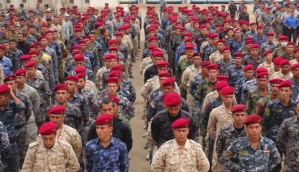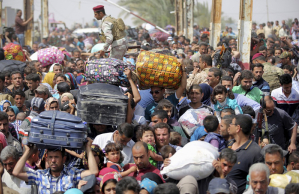
Thousands of Shiite, Iraqi and Sunni paramilitary are massing up in different points near Anbar province to retake the strategically important city of Ramadi which fell to the Islamic State (ISIS) militants on Sunday after killing hundreds of Iraqi soldiers and civilians.
A report by the IBTimes, an estimated 3,000 Iranian-backed Shiite-led fighters are being mobilized by the Iraqi administration after ISIS gained control of Ramadi, which lies 110kms northwest of the capital Baghdad.
A statement of the Anbar provincial council said, "The Iraqi army has formed two regiments of Anbar tribal fighters who had previously joined Hashd al-Shaabi [Popular Mobilisation Units] in Anbar and were being trained at the Habbaniyah military base east of Ramadi. The regiments consist of 1,000 fighters and all of them are from the Anbar tribes."
Iraqi authorities said the militiamen are well-equipped and are fully trained to challenge the ISIS. The group is planning to launch their offensive south of Ramadi, a Sunni-dominated region in central Iraq.
Ramadi fell into ISIS control after several days of intense fighting. The U.S.-led coalition air strikes failed to provide the Iraqi army the necessary military advantage as pictures of Iraqi forces in rapid retreat on board U.S.-made Humvees circulate while the militants celebrate their triumph while entering the city.
The battle for Ramadi left an estimated 500 Iraqi security forces and civilians killed by ISIS militants.

The campaign in Ramadi against the ISIS is reminiscent of the battle in Tikrit, another predominantly Sunni city. Some 12,000 Shiite militiamen joined the Iraqi Security Forces in March to recapture Tikrit that had been under ISIS control since last year. Roughly 2.000 Sunni fighters also joined that fight.
Many believe that this could become a pattern in the overall strategy against the ISIS even as Iraqi Prime Minister Abadi initially rejected the deployment of Shiite militias because of fear their presence might trigger a sectarian unrest.
Some residents in the Ramadi have expressed concern over the entry of Shiite militias in the region. Abu Ammar, a native of Iraq's Anbar province, who owns a grocery store in Ramadi, was quoted as saying, "If the Shiite militias enter Ramadi, they will do the same things being done by Daesh. In both cases, we will be either killed or displaced. For us, the militias and IS militants are two faces of the same coin."
In the south of Anbar, another 4,000 Sunni tribal fighters have deployed to join the campaign in flushing out the ISIS militants.
Anbar governor Ethel al-Nujaifi told journalists at a press conference after the fall of Ramadi, "The message that we pass it to the U.S. side includes the need to deliver the needed weapons to fight Daash [ISIS] ... and support the security forces close to the city and ready to fight."
On Monday, thousands of Iraqi paramilitary units launched a fresh attack on the Western province of Anbar to drive away the ISIS militants, reported Goerie.com.
At the same time, U.S.-led coalition jets have stepped up their air war against the ISIS as U.S.
Secretary of State John F. Kerry expressed confidence that a major counteroffensive would eject the militants from Ramadi.
Kerry said, "I am absolutely confident in the days ahead that will be reversed."
Anbar province, is a very strategic and important city for Iraq. The province borders Jordan and Saudia Arabia and comprised almost one-third of the country and is an vital link and supply corridor to the Islamic State strongholds in neighboring Syria.






